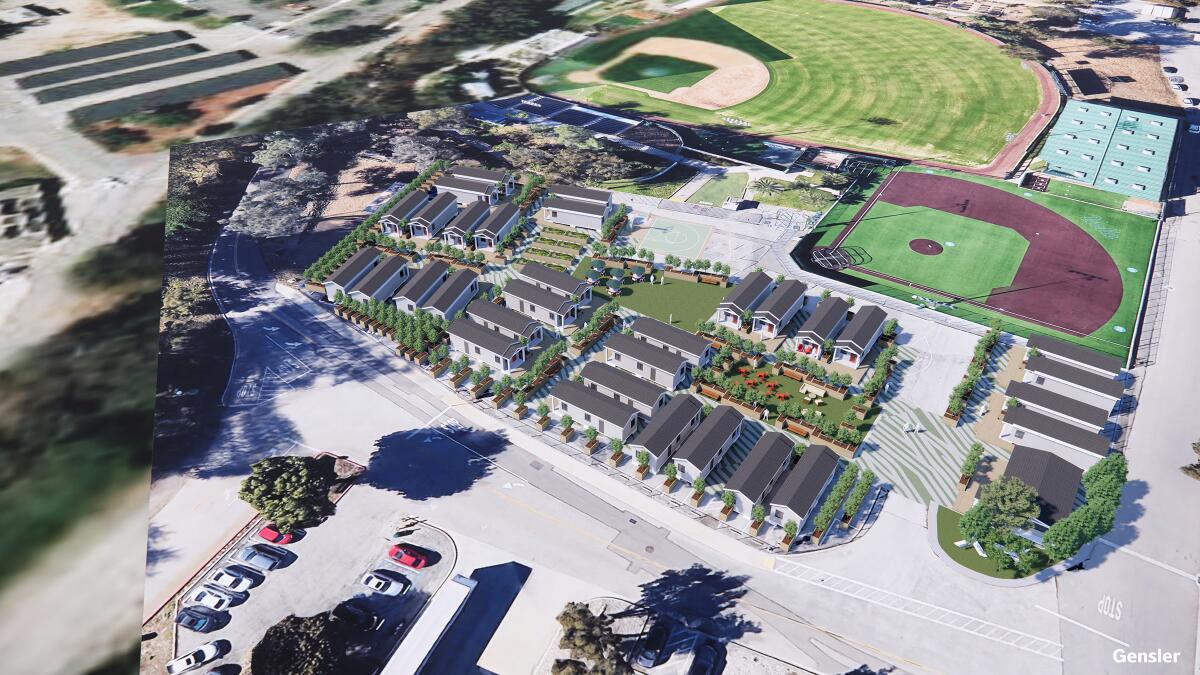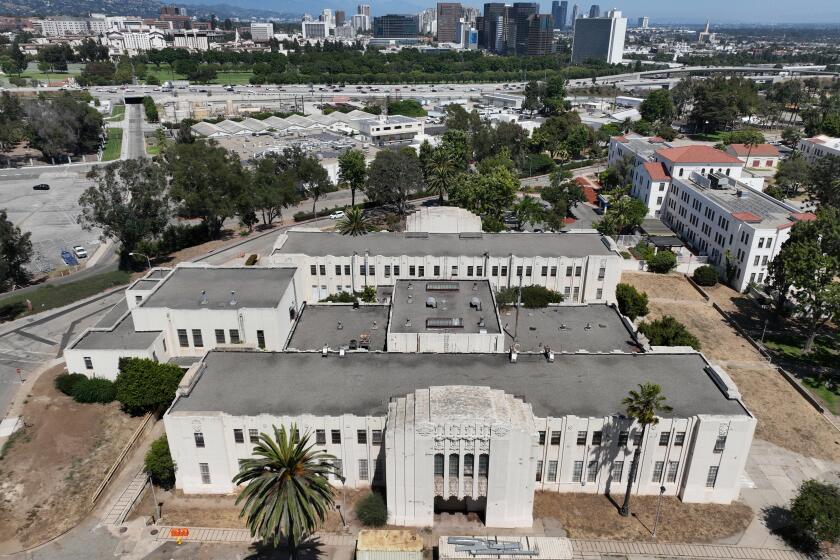Well maybe not the program but a place to play...
Judge orders VA to build housing on UCLA baseball parking lot. On the double!

In a matter of months, if a federal judge’s order holds up, the parking lot for UCLA’s Jackie Robinson Baseball Stadium will be filled with modular housing.
U.S. District Court Judge David O. Carter on Friday ordered the U.S. Department of Veterans Affairs to select a vendor within a week and have a contract three weeks after that.
Thirty-two of them would occupy the parking lot of the baseball complex that Carter ordered shuttered in September and the rest would be placed on two other parcels of the VA’s West Los Angeles campus.
After pressing VA officials to produce some temporary housing in a mere 90 days, before the rainy season, Carter relaxed his timeline Friday after VA officials agreed to the endeavor but pleaded that the contracting, site development and installation could not be done that soon.
The order is Carter’s opening gambit — in the judge’s words, an “icebreaker” to cut through bureaucratic malaise — toward an ambitious goal. He’s ordered the VA to create up to 750 units of temporary housing in 18 months on its West Los Angeles campus and an additional 1,800 permanent units over six years.
Carter laid out that goal in early September at the conclusion of a four-week civil trial, when he also nullified leases of VA land to private entities including UCLA and the private Brentwood School because they failed to meet the legal standard of service to veterans.
The lawsuit, filed on behalf of veterans by the nonprofit Public Counsel, the Inner City Law Center and two private law firms, alleged that the VA failed in its fiduciary duty to provide housing for disabled and homeless veterans on the campus.
In the weeks since his ruling, Carter has wrestled with a tangle of unresolved questions about how this all would play out.
Where would all the housing go on the VA’s already crowded campus? Where would up to a billion dollars be found to pay for it? How would one of America’s largest bureaucracies become nimble enough to do it?
And, on the other side of the equation, what would become of the Jackie Robinson Stadium and Brentwood School’s 22-acre sports complex, which boasts an Olympic pool, football stadium, basketball pavilion, tennis courts and baseball fields?
Carter expressed hope the affected parties would come up with the answers. When they didn’t, he blustered over the course of half a dozen hearings, at one point threatening to bulldoze Brentwood’s pool or fill it with sand.
The Brentwood School got the message. Chairman Adam Cohn began attending hearings, sitting attentively in the gallery as attorney Louis “Skip” Miller assured the court the school earnestly wanted to reach a settlement.
As the Brentwood talks made progress, Carter rolled back his rhetoric, disclaiming any intention to harm “the kids.”
“In a sense, there’s no reason to destroy any of these facilities if we don’t have to,” he said, anticipating that veterans would make increasing use of them as new housing brought thousands to the 388-acre campus.
The vibe went the other way in September for UCLA when attorney Raymond Cardozo raised the likelihood of an appeal — which they ultimately filed — and presented a unilateral proposal to nearly double the school’s rent and “cede” back two of the lease’s 10 acres.
“Cede” did not sit well with a judge who had repeatedly advised attorneys not to imply that the land was anyone’s to give back.
“Unless the 9th Circuit reverses me, this is veterans’ land,” he had said.
Finding the proposal inadequate, Carter on Sept. 25 ordered the stadium cordoned off until the university came up with an acceptable proposal.
Then he zeroed in on the stadium’s parking lot, and another one nearby, as a test case to see how fast he could make the VA move.
“If I can get 60 or 70 veterans ... out of a cardboard box before the rain comes, and this is a fast-track way to do it, where this lot is already paved, that’s exactly what I’m suggesting we could do,” he said.
He put that plan into an order on Oct. 2, requiring the VA to select a vendor who could deliver and install units in 45 days and to come up with the money.
Steve Soboroff and Randy Johnson, the Playa Vista developers who testified for the plaintiffs as expert witnesses and were then drafted by the judge as his housing gurus, had assured him that hundreds of modular units could be in place in 18 months.
To Carter’s displeasure, even they blanched at his desire to do it in less than 90 days.
“I need to get homeless off the street now,” he told Soboroff. “And you said you wanted to get going, so get going.”
Soboroff and Johnson returned on Oct. 11 with a schematic showing 32 modular units on the UCLA parking lot and 24 on a nearby lot owned by the National Cemetery Administration.
With help from Kelly Farrell, co-managing director in Los Angeles for the architectural giant Gensler, they said they had identified 26 pre-manufactured homes that could be “trucked in, set on site, tied down for seismic and hooked up for utilities.” And they were still making calls.
Buoyed by that promise, Carter raised the stakes. His thinking often shifting, Carter had begun to muse from the bench on the possibility that too much temporary housing could be built.
“I’d like to get to 100 as quickly as I could and just stop for a moment and take a breath and see what we really need, how many folks we’re getting in,” he said.
On Friday, Soboroff and Johnson returned with a new schematic showing 50 units on a triangular parking lot in the center of the campus. The VA objected to that location, where veterans with addictions would be welcomed, as too close to the Domiciliary where veterans practice sobriety. It reluctantly agreed to an alternative location on the south side of the campus, while also objecting that it was too remote from other housing.
In a final confusing twist to negotiations, the VA agreed to pursue the plan and pay for 106 units but did not concede its right to appeal the order.
The plaintiffs are now required to provide pricing and specifications for the units by Tuesday. Johnson has estimated the cost at around $130,000 per unit with transportation and site development.
With the “icebreaker” plan in motion, big obstacles still loomed, principal among them the estimated billion-dollar cost for all the housing required in his initial decision.
There was also the possibility of reversal. By Friday two leaseholders, including UCLA, had filed appeals. Justice Department attorney Brad Rosenberg told the court the decision whether the government would appeal would be made by the Office of General Counsel, not him.
But Rosenberg had repeatedly put the court on notice that the government disagreed with Carter’s underlying ruling that the VA had a fiduciary duty to build housing for veterans on the campus at all.



